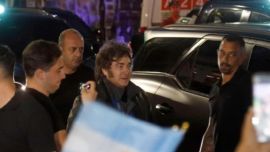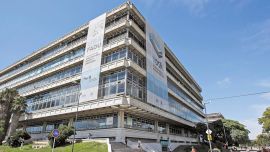According to President Alberto Fernández’s version of events, which he recounted in the interview he gave last Wednesday to Radio 10, the problems of heartburn and stomach discomfort that afflict him have been happening for some time. Those close to him say that, in recent days, these problems have become more pronounced. No one knows for sure whether this coincided with the slimming diet that the president began to follow a few weeks ago.
The "Alberto diet,” which, according to him, essentially consists of long fasts and the elimination of sweets and flour, has been the subject of much criticism from several prominent nutritionists. It is not known whether the diet was approved by the president's personal physician, Dr. Federico Walter Saavedra.
What is certain is that at the G20 Leaders Summit in Bali, Indonesia, there were moments of great anguish for the presidential entourage when Fernández almost fainted during a conversation he was having with Spain’s Prime Minister Pedro Sánchez on the sidelines of the event. "A doctor, please a doctor" shouted the excellent presidential translator, Walter Kerr, at the top of his voice when he realised the seriousness of what was happening.
Everything that followed had tinges of intense drama. Part of it was reflected in Sánchez’s anguished face. In the elevator that took the president from the hall to the entrance where an ambulance was stationed, the head of state suffered another dizzy spell. He did not collapse because he was supported by the arms of those accompanying him, among whom was the presidential chief-of-staff, Julio Vitobello.
Anguish and fear gripped the Argentine delegation. Despite the president's denials (he tried to play down the incident), the episode was serious. “He lost quite a lot of blood,” admitted one of the officials who accompanied the head of state during those hours of great tension. Once in hospital, blood tests and an endoscopy were carried out, which revealed the cause of the problem: a haemorrhage caused by erosive gastritis.
The condition is defined as inflammation of the stomach mucosa leading to erosion that can lead to haemorrhage. The most frequent causes of this pathology are the ingestion of alcohol, anti-inflammatory drugs and stress. In general, it is an acute condition which, in mild cases, may be asymptomatic or present in symptoms such as dyspepsia, nausea, vomiting and/or pain. In more severe cases, it can lead to a haemorrhage in the form of vomiting blood (haematemesis) or blood can appear in faecal matter (melena). Significant blood loss can lead to a drop in blood pressure – hypotension – which, in severe cases, can lead to fainting.
The condition is diagnosed by endoscopy. Treatment of severe cases consists of elimination of the noxa, i.e. the agent causing damage to the gastric mucosa, intravenous hydration and endoscopic haemostasis. If bleeding does not stop, surgery may be necessary.
It is good practice to keep a patient who has experienced a gastric bleeding episode in a medical facility for at least 24 to 48 hours to ensure they rest and to initiate treatment, monitor progress and prevent possible complications. Failure to do so posed a risk to the president.
Some of the journalists who covered the presidential tour claim that in communications between Dr. Federico Saavedra, the head of the Presidential Medical Unit, and Dr. Manuel Estigarribia, who was the doctor assigned to this tour, and some of the members of the team that accompanied Fernández to hospital, there was an order given to discharge him from the Sanglah General Hospital as soon as possible and to avoid a blood transfusion at all costs. The reason for this was apparently the lack of supplies at the medical facility. Curiously enough, it was there that he underwent the endoscopy that led to the diagnosis. An endoscopy requires a specialist doctor and an anaesthetist to administer propofol, the sedative used for this procedure, intravenously.
Dr Horacio Rubio, the former president of the Inter-American Society of Endoscopy, said clearly that if "the person has had a gastrointestinal haemorrhage, it is necessary to assess whether they are haemodynamically stabilised; in the vast majority of cases they are hospitalised for 24 to 48 hours." Dr Fabio Nachman, head of the Gastroenterology Department at the Hospital Universitario, said that “when there is a digestive haemorrhage, it is necessary to hospitalise; it is one of the emergencies in gastroenterology.”
Last Saturday, as is standard practice, the president underwent an endoscopic examination at the Otamendi Sanatorium. The brief medical report issued by the Presidential Medical Unit stated that no "lesions with active bleeding" were found and that he was prescribed "rest and a gradual return to work.” The normal treatment methods prescribed, which, in addition to rest, surely includes gastric mucosa protectors and instructions about his diet, were not specified.
On Friday, April 9, 2004, then-president Néstor Kirchner suffered an upper gastrointestinal haemorrhage caused by erosive duodenitis brought on by the ingestion of ketorolac, a potent anti-inflammatory drug. His doctor, Dr. Luis Bonomo, judiciously decided to hospitalise him for 48 hours at the Hospital Río Gallegos. As you can see, power makes you sick.



















Comments